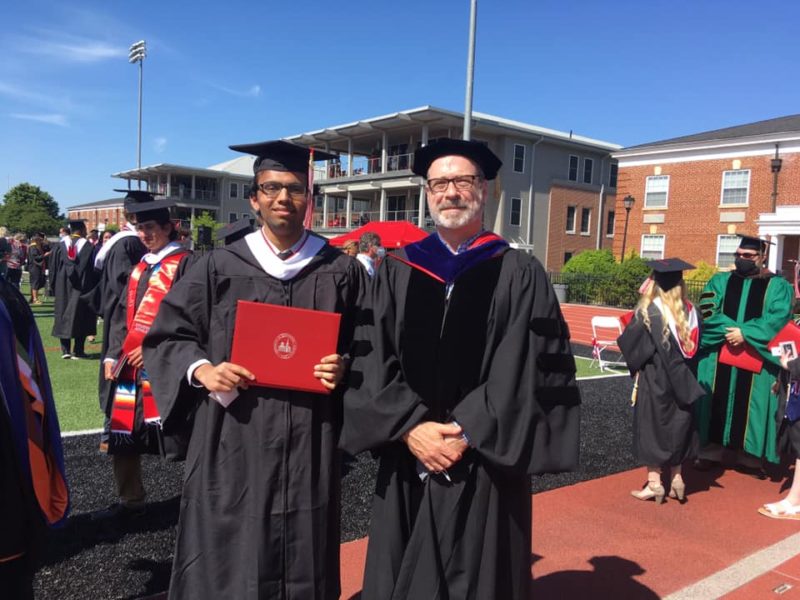The University of Lynchburg’s first intelligence studies major, Vedant Patel ’21 of Yorktown, Virginia, graduated Thursday, May 20. It was no small feat, considering the major has only been offered at Lynchburg since the fall of 2020.
To finish up before Commencement, Patel, who also was majoring in criminology with a minor in international relations, had to get a move on. “Vedant worked double time to get the coursework done,” Dr. David Richards, chair of the political science and international relations and security studies programs, said.
Patel started thinking about a career in intelligence during his sophomore year at Lynchburg. “I knew I was interested in the criminal justice system, but I did not want to be a police officer,” he said. “I was thinking about possibly doing forensics. I liked trying to figure out complicated puzzles and finding details in a problem that would help solve it.
“After taking courses for international relations and discussing more career options with Professor [Keith] Smith, especially within the federal government, I found that working in intelligence was something that I was drawn to more.”
Smith, who died in February, joined Lynchburg’s criminology faculty in 2016 after a distinguished law enforcement career. Working with the New York Police Department, Drug Enforcement Administration, and other agencies, he fought crime on city streets, the jungles of Latin America, and deserts in the Middle East.
“His experiences and insight in working with the federal government helped me decide what I wanted to do in the future,” Patel said. “Hearing his stories from his work abroad as a federal agent added another layer of personal experience that we were able to get during class. I was very saddened to hear about his passing earlier this year.”

The intelligence studies major was developed by three members of the Lynchburg faculty: Richards, Smith, and history professor Dr. Brian Crim.
“The intelligence community includes almost 20 departments and agencies across the government,” Crim said. “This doesn’t even include law enforcement intelligence, which is growing in importance. We recognized the need for this new major to prepare our respective students for this growing career field.
“The intelligence studies major combines courses in international relations, political science, history, criminology, and foreign languages. We created specific intelligence analysis courses to teach the craft of writing and researching for this specific career field.”
Crim said he and other faculty expected students like Patel to combine intelligence studies with another major. “I believe being a criminology major is perfect because it allows Vedant to look at both foreign and domestic intelligence agencies for careers,” Crim said.
“He has specific experience in two overlapping fields. I also think law enforcement is placing more of a premium on intelligence gathering and analysis, which makes his double major valuable.”
Patel, who is currently in the hiring process with a federal agency, agreed. “The classes taught in those two programs helped me understand more about the field and think about issues in a way that I would never have thought about before,” he said.
“They challenged your thinking, but not in a way to minimize what your previous thinking had been. Learning about how the two programs connected with each other also provided a great opportunity to look at an issue from a different perspective.
“The aspect of intelligence being more global is something that I found intriguing. Thinking about problems and how to deal with issues, not only in the U.S. but abroad, was something that influenced me to go that career route.”
Crim, a former U.S. intelligence analyst who tracked Al-Qaeda and researched right-wing domestic terrorism, among other things, admits he could have benefited from the intelligence studies coursework himself.
“I have to say I could have really used this major,” he said. “As a historian, I was trained to analyze information, write it up for non-experts, and find connections between past and present activity, but I knew nothing about how the whole environment worked.
“I didn’t know who talked to whom and why, the special language used, or how to write very quickly to keep up in a fast-moving environment. The intelligence studies major prepares students for that.”
For Lynchburg students, the first class offered in the major, Introduction to the Intelligence Community, removes some of the mystery surrounding intelligence work. “The most important part of the course is a simulation in which I divide students into groups representing different parts of the intelligence community,” Crim said.
“Students write and brief each other about the fake intelligence traffic I create for them. Vedant was a member of the Central Intelligence Agency group, probably the busiest, as you can imagine. He did great, which is encouraging given how hard things were this year.
“I spent a significant portion of the class talking about the intelligence profession and how to navigate things like security clearances and where to look for job openings. He is entering the field at the right time.”

